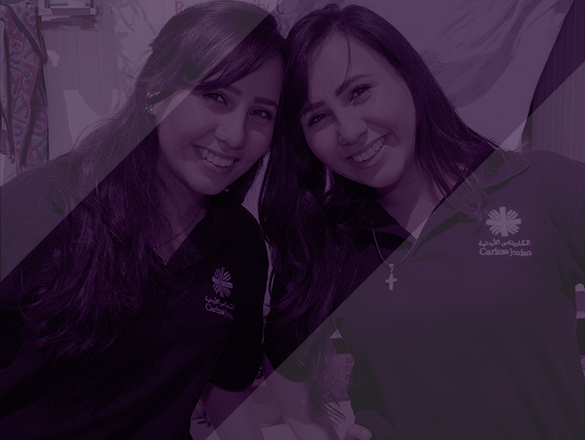We’re at our best when the worst happens.
In FY16, CRS provide timely, quality, dignified emergency support in 55 countries. Our global footprint has grown to include Greece, Macedonia and Ecuador. Serving the most vulnerable in our world requires the utmost flexibility to scale up and adapt programming in a changing, fluid landscape. Thanks to the dedication of our local partners, and the unwavering presence of Caritas and the local Catholic Church, we can respond at a moment’s notice.
Refugees rebuild their lives—and a local economy
When responding to a humanitarian emergency, providing people with immediate, safe shelter is paramount. But no situation is alike. After Typhoon Haiyan struck the Philippines, the repair and rebuilding of homes was appropriate. For Syrian refugees living in the urban cities of Jordan, rental support in the form of cash grants is a better solution.
To be effective, CRS emergency shelter teams look at the unique needs of the affected population as well as the communities around them. For example, Athens, Greece became the epicenter of Europe’s refugee crisis in 2015. The city received 200,000 refugees and migrants in addition to the 700,000 that entered the country in 2014. Most were passing through to make their way to countries like Germany and Sweden, but their options shifted in March when the Balkan states closed their borders. About 60,000 refugees remained in Greece, living in overcrowded camps. Most refugees were physically and emotionally drained, having fled intense conflict or poverty.
“The refugee problem in Greece came at a time that a country is suffering,” says Martha Giannacopoulou, CRS architect in Athens. “Thirty percent of buildings have been vacant or abandoned due to the collapsed economy. So, we said, Okay, let's start looking at these buildings, at a city that is in need.”
The vacant buildings represented critical living space, but they needed significant upgrades. CRS and Caritas worked in partnership with UNHCR to convert dozens of vacant buildings into temporary housing. Our architects reached out to the building owners and offered upgrades and repair, in addition to rent at market rate. The refugees staying in the shelters stay 2 to 3 months, on average, as they are in the process of transiting to a country of asylum in the European Union.
As one building owner described it, “It is a win-win.” Money is injected into the economy, abandoned buildings are brought back to life, and vulnerable families have a safe place to rest as they prepare for their next step.
“It's the first time after so long that I feel like I'm a human being,” says Tilal Restmo of Aleppo, Syria, now in the CRS-supported apartment with his wife and 6 children as they prepare to move to Lithuania, which granted them asylum. “I pray to God what we’ve been through never happens to any other human being. Hopefully, Lithuania will be a new beginning for us, a good life. This is what we hope for. Nothing more.”
The T-Shelter keeps families together.
The Iraq emergency response reached a critical moment when 85,000 people fled after the battle for Fallujah. Stranded in informal settlements in Amiriyat Al Fallujah, displaced families were in treacherous living conditions, reachable by a bridge that was only open 4 hours a day. Explosions in the surrounding area made the location extremely insecure for humanitarian organizations.
CRS partners Caritas Iraq and the Sunni Endowment teamed up to provide emergency support for tens of thousands of people. The Sunni Endowment is the representative of the Sunni Muslim component of Iraq’s multi-religious, ethnic and tribal fabric. Their interfaith partnership is particularly significant in a conflict rooted in ethnic and religious tensions.
The CRS/Caritas Iraqi teams designed a transitional shelter, or T-Shelter, made of locally-available wood to keep families warm in the winter and cool in the summer. The doors and windows have locks, providing safety to families who have been living in fear. The shelter comes with the option of a partition and is on a raised concrete slab, which keeps the floor dry in the wet, muddy conditions. The shelter can also be disassembled so families can take it with them when they return back to their towns, providing temporary shelter while they rebuild their lives. CRS/Caritas Iraq provided shelters to 270 families and are building hundreds more, in addition to developing water and sanitation systems in the camp.
“Even though we have no house, our home is when our family is together. Before, there was no tent that could hold all of us. This shelter allows us to be together. We are dry, we have a door that we can lock and feel safe,” says Rasmia, 62, with her daughter and grandchildren.
-
Boko Haram Crisis in Cameroon, Chad, Niger and Nigeria
100,000 people served
Food assistance; living supplies; agricultural support and livelihoods recovery; water, sanitation and hygiene; financial strengthening; cash-for- work opportunities to support local infrastructure and land recovery; peacebuilding; and youth empowerment
-
People displaced by conflict in Central African Republic
140,631 people served
Food; rebuilding of homes and shelter assistance; agricultural support and livelihoods recovery; cash-for- work to repair drains, roads and bridges; social cohesion, youth empowerment and peace building
-
Drought response in Ethiopia
# of people served
Emergency food distributions; agriculture and livestock support; access to water; natural resource management; micro-savings groups; improved nutrition
-
People displaced by conflict in Mali
59,824 people served
Food, shelter, living supplies (through cash grants) cash-for- work opportunities, livestock fairs, fodder distribution, rehabilitation of water infrastructure.
-
People displaced by conflict and food insecurity in South Sudan
223,055 people served
Distributions of 5,173 metric tons of life-saving food, including with air drops; water, sanitation and hygiene; cholera prevention and response
-
Syrians displaced by conflict across the Middle East, including in Egypt, Jordan, Lebanon and Turkey
1.4 million people served
Shelter, living supplies, winter kits, water and sanitation, agriculture support, and children’s education and counseling
-
Refugee crisis in Greece, Macedonia and Serbia
350,000 people served
Emergency food and supplies, primarily through cash assistance; temporary shelter through the upgrade of vacant apartment buildings; children’s counseling and support; information, translation and legal support; urban social service center, including access to social workers and a soup kitchen; transit camp improvements, including repair of road, sewage system, and infrastructure support; and specialized items and support for children with special needs and people with disabilities
-
People displaced by conflict in Iraq
250,000 people served
Food assistance, primarily through cash grants; shelter; living supplies and winter kits; emergency preparedness through trainings of staff and partners, and positioning of supplies; water, sanitation and hygiene; emergency living supplies for newly displaced; educational, emotional care and counseling; school improvements
-
People displaced by conflict in Ukraine
96,000 people served
Living supplies, shelter assistance and repair, children’s education and counseling; and livelihoods support through vocational trainings, job resource support and small business development
-
Earthquake recovery in Nepal
171,620 people served
Shelter assistance including supplies to repair homes and trainings for local masons on earthquake-resistant construction techniques; water, sanitation and hygiene; livelihoods recovery
-
Typhoon Haiyan recovery in the Philippines
400,000 people served
Shelter repair and rebuilding, and neighborhood resettlement; livelihoods and market recovery; water, sanitation and hygiene; disaster risk reduction
-
Earthquake relief in Ecuador
# of people served
Shelter repair and rebuilding; living supplies; water, sanitation and hygiene












